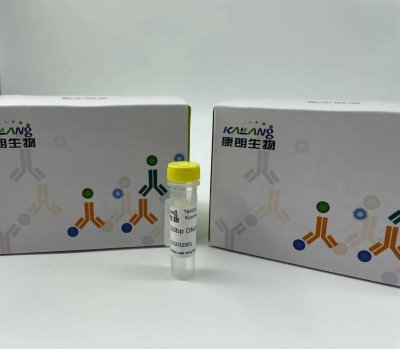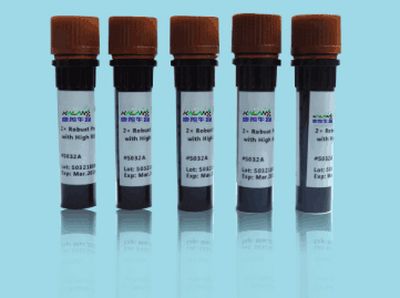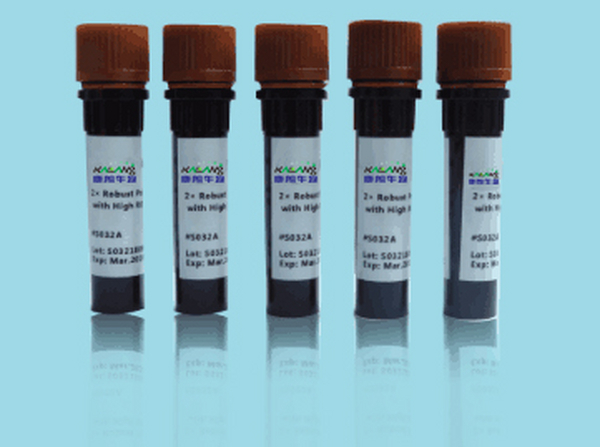QQ:3002763590


客服电话:021-61998208
TRML2 rabbit Polyclonal Antibody
TRML2抗体
TRML2抗体应用:WB 1:500-2000 ELISA 1:5000-20000triggering receptor expressed on myeloid cells like 2(TREML2) Homo sapiens TREML2 is located in a gene cluster on chromosome 6 with the single Ig variable (IgV) domain activating receptors TREM1 (MIM 605085) and TREM2 (MIM 605086), but it has distinct structural and functional properties (Allcock et al., 2003 [PubMed 12645956]).[supplied by OMIM, Mar 2008],
TRPA1 rabbit Polyclonal Antibody
TRPA1抗体
TRPA1抗体应用:WB 1:500-2000 ELISA 1:5000-20000transient receptor potential cation channel subfamily A member 1(TRPA1) Homo sapiens The structure of the protein encoded by this gene is highly related to both the protein ankyrin and transmembrane proteins. The specific function of this protein has not yet been determined; however, studies indicate the function may involve a role in signal transduction and growth control. [provided by RefSeq, Jul 2008],
TRPC1 rabbit Polyclonal Antibody
TRPC1抗体
TRPC1抗体应用:WB 1:500-2000 ELISA 1:5000-20000transient receptor potential cation channel subfamily C member 1(TRPC1) Homo sapiens The protein encoded by this gene is a membrane protein that can form a non-selective channel permeable to calcium and other cations. The encoded protein appears to be induced to form channels by a receptor tyrosine kinase-activated phosphatidylinositol second messenger system and also by depletion of intracellular calcium stores. Two transcript variants encoding different isoforms have been found for this gene. [provided by RefSeq, Oct 2011],
TRPC5 rabbit Polyclonal Antibody
TRPC5抗体
TRPC5抗体应用:WB 1:500-2000 This gene belongs to the transient receptor family. It encodes one of the seven mammalian TRPC (transient receptor potential channel) proteins. The encoded protein is a multi-pass membrane protein and is thought to form a receptor-activated non-selective calcium permeant cation channel. The protein is active alone or as a heteromultimeric assembly with TRPC1, TRPC3, and TRPC4. It also interacts with multiple proteins including calmodulin, CABP1, enkurin, Na(+)-H+ exchange regulatory factor (NHERF ), interferon-induced GTP-binding protein (MX1), ring finger protein 24 (RNF24), and SEC14 domain and spectrin repeat-containing protein 1 (SESTD1). [provided by RefSeq, May 2010],
TRPC6 rabbit Polyclonal Antibody
TRPC6抗体
TRPC6抗体应用:WB 1:500-2000 The protein encoded by this gene forms a receptor-activated calcium channel in the cell membrane. The channel is activated by diacylglycerol and is thought to be under the control of a phosphatidylinositol second messenger system. Activation of this channel occurs independently of protein kinase C and is not triggered by low levels of intracellular calcium. Defects in this gene are a cause of focal segmental glomerulosclerosis 2 (FSGS2). [provided by RefSeq, Mar 2009],
TRPC7 rabbit Polyclonal Antibody
TRPC7抗体
TRPC7抗体应用:WB 1:500-2000 ELISA 1:5000-20000function:Thought to form a receptor-activated non-selective calcium permeant cation channel. Probably is operated by a phosphatidylinositol second messenger system activated by receptor tyrosine kinases or G-protein coupled receptors. Activated by diacylglycerol (DAG) (By similarity). May also be activated by intracellular calcium store depletion.,similarity:Belongs to the transient receptor family. STrpC subfamily.,similarity:Contains 4 ANK repeats.,subunit:Interacts with MX1 and RNF24.,
TRPM2 rabbit Polyclonal Antibody
TRPM2抗体
TRPM2抗体应用:WB 1:500-2000The protein encoded by this gene forms a tetrameric cation channel that is permeable to calcium, sodium, and potassium and is regulated by free intracellular ADP-ribose. The encoded protein is activated by oxidative stress and confers susceptibility to cell death. Alternative splicing results in multiple transcript variants encoding distinct protein isoforms. Additional transcript variants of this gene have been described, but their full-length nature is not known. [provided by RefSeq, Feb 2016],
TRPM4 rabbit Polyclonal Antibody
TRPM4抗体
TRPM4抗体应用:WB 1:500-2000 The protein encoded by this gene is a calcium-activated nonselective ion channel that mediates transport of monovalent cations across membranes, thereby depolarizing the membrane. The activity of the encoded protein increases with increasing intracellular calcium concentration, but this channel does not transport calcium. [provided by RefSeq, Mar 2016],
TRPM7 rabbit Polyclonal Antibody
TRPM7抗体
TRPM7抗体应用:WB 1:500-2000 ELISA 1:5000-20000transient receptor potential cation channel subfamily M member 7(TRPM7) Homo sapiens The protein encoded by this gene is both an ion channel and a serine/threonine protein kinase. The kinase activity is essential for the ion channel function, which serves to increase intracellular calcium levels and to help regulate magnesium ion homeostasis. Defects in this gene are a cause of amyotrophic lateral sclerosis-parkinsonism/dementia complex of Guam. Alternative splicing of this gene results in multiple transcript variants. [provided by RefSeq, Jul 2014],
TRPM8 rabbit Polyclonal Antibody
TRPM8抗体
TRPM8抗体应用:WB 1:500-2000 ELISA 1:5000-20000function:Receptor-activated non-selective cation channel involved in detection of sensations such as coolness, by being activated by cold temperature below 25 degrees Celsius. Activated by icilin, eucalyptol, menthol, cold and modulation of intracellular pH. Involved in menthol sensation. Permeable for monovalent cations sodium, potassium, and cesium and divalent cation calcium. Temperature sensing is tightly linked to voltage-dependent gating. Activated upon depolarization, changes in temperature resulting in graded shifts of its voltage-dependent activation curves. The chemical agonists menthol functions as a gating modifier, shifting activation curves towards physiological membrane potentials. Temperature sensitivity arises from a tenfold difference in the activation energies associated with voltage-dependent opening and closing.,miscellaneous:Its expression in most prostate tumors as well as the presence of an immunogenic epitope suggest th
最新动态
-

Anti-GNGT1 KL20092-001(50ul)
2021-10-11 -

Anti-GNGT1 antibody(50ul) KL20093-001
2021-10-11 -

MUC5AC (PT2058) mouse Monoclonal Antibody
2021-01-06 -

mOrange mouse Monoclonal Antibody(Mix)
2021-01-05
热门标签
- Histone H3 rabbit Polyclonal Antibody Histone H3抗体
- EGFR rabbit Polyclonal Antibody EGFR抗体
- Cy3 Conjugated
- AbFluor™ 555 Conjugated
- AbFluor™ 680 Conjugated
- AbFluor™ 350 Conjugated
- AbFluor™ 647 Conjugated
- AbFluor™ 594 Conjugated
- AbFluor™ 405 Conjugated
- Cy5 Conjugated
- AbFluor™ 488 Conjugated
- Cyclophilin B抗体 Cyclophilin B Monoclonal Antibody(2B10)
- COX IV抗体 COX IV Monoclonal Antibody(6C8)
- PCNA抗体 PCNA Monoclonal Antibody(12D10)
- FAK rabbit Polyclonal Antibody FAK抗体
邮箱:3002763590@qq.com
电话:021-61998208

扫码关注微信公众号






